US Urges Iraq To Protect Its Troops From Iran-Backed Groups
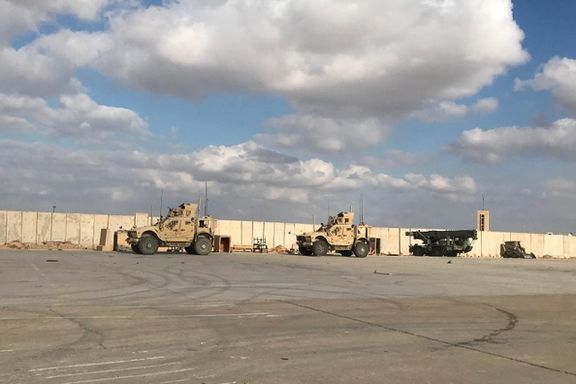
Iraq should fulfill its commitments to protect all bases hosting US troops, Secretary of State Antony Blinken told the Iraqi Prime Minister in telephone call on Friday.

Iraq should fulfill its commitments to protect all bases hosting US troops, Secretary of State Antony Blinken told the Iraqi Prime Minister in telephone call on Friday.
“The Secretary called on the Iraqi government to fulfill its commitments to protect all installations hosting U.S. personnel at its invitation and to pursue those responsible for attacks on U.S. personnel in Iraq,” the State Department said in a statement describing the call with Prime Minister Mohammed Shiaa al-Sudani.
The call came after Iranian-backed militant groups in Iraq launched dozens of attacks on military bases hosting US and coalition troops since the October 7 Hamas attack on Israel and the ensuing war in Gaza.
Iran-backed Shiite militants have taken responsibility for the attacks claiming that their actions are in retaliation for US support for Israel in its conflict with Hamas.
The Iranian government has denied any responsibility, claiming that “resistance” groups are acting on their own, angered by the war. However, Iran is in control of all forces it labels as the “Resistance Front” in the region and has repeatedly vowed that their mission is to expel the United States from the region. PM al-Sudani is part of a coalition backed by the Iran-supported groups.
The US military conducted retaliatory strikes against some of the Iraqi groups on November 21, but this has failed to deter the militants. Many critics in the United States have accused the Biden administration of not responding forcefully enough to Iranian-backed groups, some suggesting that retaliation should be directed against the Revolutionary Guard.
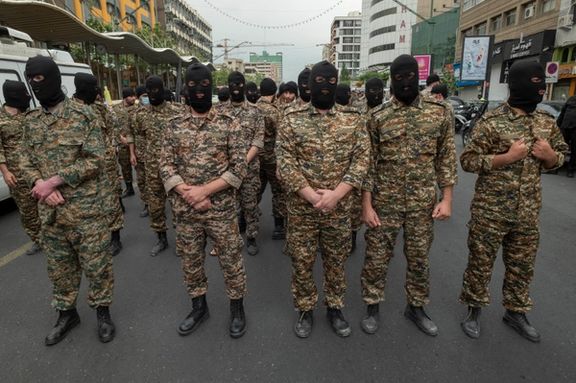
The latest US annual Terrorism Report reiterated that Iran “continued its extensive support for terrorism,” providing funding, training and weapons to militant groups.
The 2023 report issued on November 30, covered the situation in 2022 and declared in its introduction to country reports that “Iran continued to be the leading state sponsor of terrorism, facilitating a wide range of terrorist and other illicit activities around the world.”
The year the report covered coincided with extensive indirect negotiations between Washington and Tehran on Iran’s expanding nuclear program and increasing uranium enrichment. By the end of 2022, a new nuclear deal remained elusive, but the Islamic Republic had stockpiled enough fissile material to build at least three nuclear weapons.
However, while holding talks on the nuclear issue, Iran continued its political and material support for its vast network of militant proxy groups in the region, that were targeting US forces in Iraq and Syria.
Iranian terror threat reached the shores of the United States, according to US federal agencies. “In 2022, Iran increasingly encouraged and plotted attacks against the United States, including against former U.S. officials, in retaliation for the death of Islamic Revolutionary Guard Corps-Qods Force (IRGC-QF) Commander Qasem Soleimani,” the report says. Former Secretary of State Mike Pompeo and former national security adviser John Bolton have been on Iran’s hit list and received additional security protection.
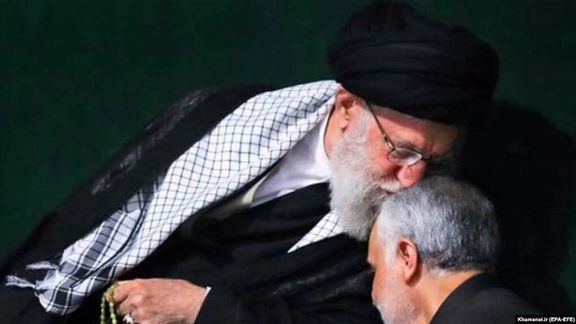
The report also accused the Islamic Republic of orchestrating threats against dissidents abroad. “As in past years, the Iranian government continued supporting terrorist plots or associated activities targeting dissidents and other perceived enemies of the regime. A British intelligence agency publicly reported uncovering at least 10 potential threats emanating from Iran’s government to kidnap or kill individuals in the United Kingdom in 2022.”
Iran International television network was the target of some of these plots in 2022, and was forced to temporarily shift its broadcast operations from London to Washington DC under advisement by UK security officials.
“Regionally, Iran supported acts of terrorism in Bahrain, Iraq, Lebanon, Syria, and Yemen through proxies and partner groups such as Hizballah and al-Ashtar Brigades,” the report stated, but also highlighted Iranian threats beyond the Middle East. “Globally, the IRGC-QF and the Ministry of Intelligence and Security remained Iran’s primary actors involved in supporting terrorist recruitment, financing, and plotting across Africa, Asia, Europe, and North and South America.”
Iran’s foreign ministry responded to the US annual report on Saturday, unleashing a series of accusations, condemning Washington of establishing and supporting the Islamic State group. It also used the “terrorist” label for US efforts to support Israel.
Foreign ministry’s spokesman Naser Kanaani rejected the terrorist label for what Tehran calls “The Resistance Front,” comprised of groups supported and controlled by the Islamic Republic. “It is clear to everyone that the United States government is the main culprit in the formation, training, equipping, and guidance of ISIS terrorists. Recently, with comprehensive support for state-sponsored terrorism by the Israeli regime and providing various bombs and deadly weapons to this terrorist regime,” the US has been “a partner in genocide against Palestinian,” Kanaani insisted.
The US report, however, reiterated that Iran’s main vehicle to support militant groups is the Revolutionary Guard’s Quds Force (IRGC-QF). “Iran has acknowledged the involvement of the IRGC-QF in the Iraq and Syria conflicts, and the IRGC-QF is Iran’s primary mechanism for cultivating and supporting terrorist activity abroad.”
The report also emphasized that Iran continued financial and military support for the Lebanese Hezbollah and Palestinian Hamas and Islamic Jihad groups in 2022. It also beefed up the Houthis in Yemen and attacked commercial vessels in international waters in the Persian Gulf region.
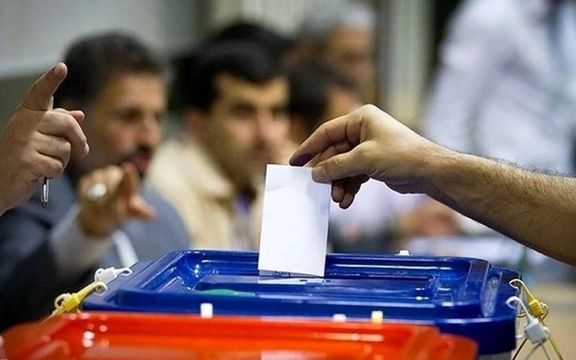
As opinion polls signal a potentially low turnout for the March parliamentary elections in Iran, many observers attribute it to widespread disqualification of candidates.
Reformist commentator Abbas Abdi, citing a poll by the ISPA agency, predicts that fewer than 15 percent of eligible voters in Tehran may participate in the March 1 election. He suggests a similar situation in other major cities. Abdi, writing in Tehran's Etemad newspaper, emphasizes that while many expected a low turnout, ISPA's poll offers a more precise estimate.
According to Abdi, the poll, which was conducted in face-to-face interviews with citizens all over Iran, showed that at least 28 percent of those who took part in it have said that they will "certainly not take part" in the elections. Another 7 percent have said that they will "most probably will not be participating.”
As an experienced pollster who has spent a year in jail previously for sharing data with US polling agency Gallop, Abdi argued that the 32 percent projected turnout, while a cautious estimate for a higher turnout, is still very low. Abdi suggested that unless the government's policies change noticeably, this figure will likely decline before voting day. He pointed out that the 32 percent projection is based on the fact that 68 percent of eligible voters are uncertain about participating, and if details are revealed, only 7 to 10 percent of educated youth may turn up.
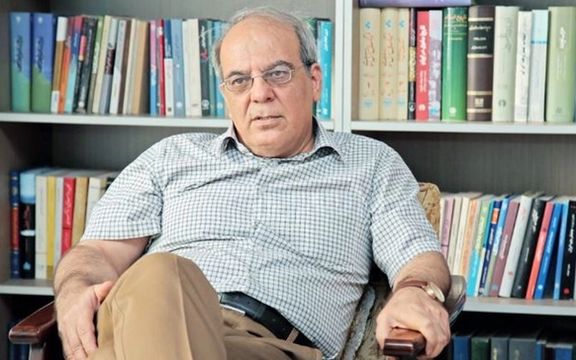
In another development reformist politician Mohammad Atrianfar told Khabar Online website in Tehran that biased and selective vetting of candidates has badly harmed the situation of elections in Iran.
This comes while conservative commentator Naser Imani who took part in an interview alongside Atrianfar said that the disqualification of 10 or 20 candidates cannot affect the fate of the elections. However, Imani's figures underestimate the number of disqualified candidates as more than 40 incumbent members of the parliament and several reformist candidates are known to have been disqualified in the first phase of the vetting by the Interior Ministry.
Authorities offer no clear explanation about these disqualifications, which are widely seen as an attempt by a faction of hardliners to monopolize power.
Atrianfar said that the ambiguous situation surrounding an informal registration that was done within a very short period of time ahead of the official registration of candidates robbed many well-known politicians of the opportunity to make the right decision to run for the elections. He said both right-wing and left-wing parties have criticized the way the registration and the vetting has been done.
As a result, Atrianfar said, while usually one to two percent of those who had registered in the previous rounds of the elections were disqualified by the Interior Ministry, in this round the Ministry has disqualified between 25 to 28 percent of those who had registered.
Imani, on the other hand, said "what is likely to lead to a low turnout in the upcoming elections is the political despair that has emerged during recent years. This approach to elections has barred well-known political figures from running." He said, "If it wasn't for this mood of general despair, Mr. Atrianfar and I would have also registered to run for the Majles elections."
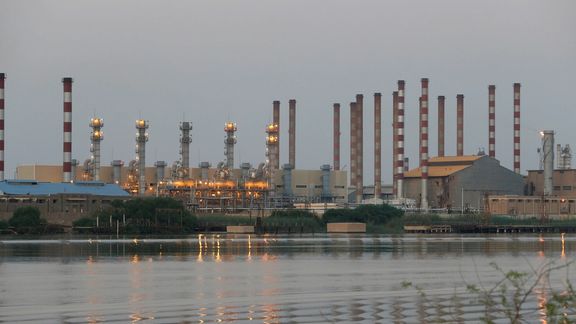
In a bizarre turn of events, the Taliban government's standards office has returned fuel tankers carrying Iranian gasoline, deeming the product below standard.
In a message on Thursday, November 29, posted on X, the Taliban stated that 24 tankers carrying low-quality Iranian gasoline were returned to Iran through the Farah' border crossing in the previous two days. In the last week, a total of 74 tankers carrying Iranian-produced gasoline have been sent back from Afghanistan.
The Afghan Islamic Emirate Standards Office has warned gasoline importers to avoid purchasing non-standard fuel, or they will face legal consequences. “Our utmost effort is for the people of Afghanistan to consume standard gasoline,” the statement said. Taliban had previously prevented the entry of shipments of non-standard gasoline produced by Iranian refineries into the country. One recent example was the return of 48 tankers carrying Iranian gasoline in September.
According to a confidential document from Iran’s Ministry of Petroleum received by Iran International, about 80% of the country's gasoline production does not meet Euro 4 and Euro 5 standards. Additionally, nearly 10 million liters of chemicals, aromatics, and the carcinogenic substance 'MTBE’ (Methyl-tertiary-butyl ether a gasoline additive--causes testicular and lymphohematopoietic cancers in rats) are mixed into produced gasoline daily. Iran’s gasoline output is around 100-110 million liters per day.
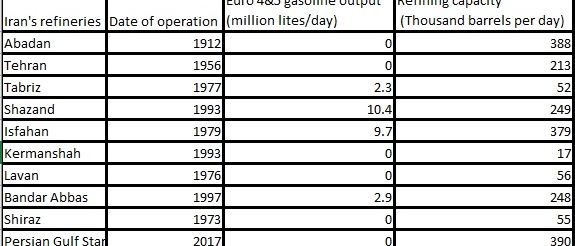
Iran has grappled with a significant gasoline shortage since last summer, prompting the addition of substances to base gasoline in refineries. This adjustment, coupled with increased gasoline combustion, has led to the production of non-standard gasoline. This, along with the consumption of fuel oil and prevalent diesel use in industries and power plants, stands as a primary contributor to severe air pollution in Iran.
Due to the Iranian government’s ban on importing quality vehicles, especially electric cars, compressed natural gas (CNG) vehicles, and the annual addition of 900,000 low efficiency domestically produced cars to the market, Iran faces a gasoline shortage crisis. Consumption has nearly doubled in the past decade, reaching 115 million liters per day.
Since the beginning of this year, the Islamic Republic has initiated limited imports of standard gasoline from Russia and other countries, primarily supplied to major cities.
Iran's refineries are outdated and worn out, converting one-third of the received oil into fuel oil and bitumen. For instance, 47% of the crude oil received by the Abadan refinery, Iran's largest crude oil refinery, almost a century old, is converted into bitumen and fuel oil. The "Global Carbon Project" study claims that throughout the previous 20 years, Iran's greenhouse gas emissions have doubled. According to BP's estimates, Iran produced almost 900 million tons of greenhouse gas emissions in 2022.
Globally, Iran is ranked sixth in term of greenhouse gas emissions level. Only three days of clear air were reported in Tehran last year; similar circumstances prevailed in several other Iranian large cities.
Dr Umud Shokri, Energy Strategist and Senior Visiting Fellow at George Mason University
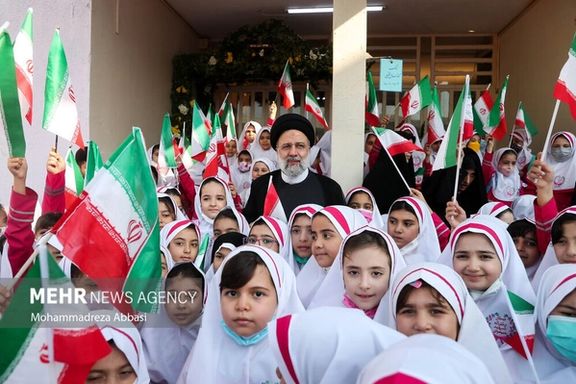
Policies adopted in recent years have seriously damaged the quality and fairness of Iran’s education system, a report released by a group of experts says.
The report an excerpt of which was published by the reformist Etemad newspaper highlights significant qualitative deficiencies in Iran's education system. Alongside these shortcomings, the system is criticized for a lack of justice in providing educational opportunities and a legitimacy gap, stemming from disparities between students' expectations and authorities' ideological perspectives.
According to the report, this disconnect has severed ties between the educational system and civil society, leading to resistance from students, their families, and even teachers against the system's policies. The study group, comprised of experts, researchers, and educators, convened at the invitation of former reformist president Mohammad Khatami (1997-2005) to address these issues.
“The education system has turned into an arena for those in power to pursue their political goals,” the report says, explaining that schoolbooks and teacher training and selection have become engineering tools to ensure the political and ideological goals.
The report contends that the accelerating privatization of education in Iran has disproportionately disadvantaged poorer regions, with some areas, like Sistan- Baluchestan Province, having villages located up to fifty kilometers from the nearest school. Schoolbooks, first re-written after the 1979 revolution, have been modified over the years to align with Islamic standards, have increasingly become tools to serve the political interests of the hardliners in power, imposing their ideological values.
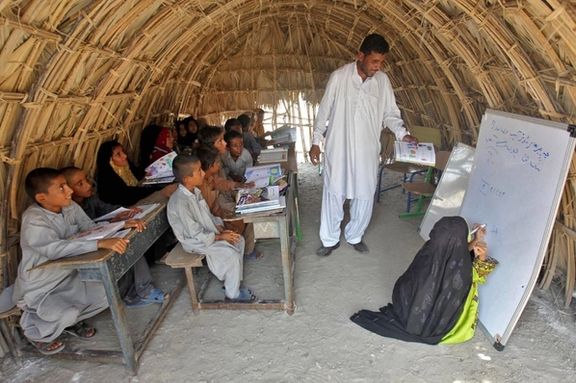
Religious censorship has invaded many textbooks, including literature and history, where the hardliner Shiite faction has imposed its own version of values on the educational system. Some writers and poets have been purged from textbooks while others have been given a more prominent place. Even Islamic history has been manipulated to fit the narrow religious agenda of the ruling hardliners.
In recent weeks, reports indicate that hardliners controlling parliament and enjoying influence in the presidential administration, have begun hiring thousands of their followers as teachers and school principals, without any consideration for qualification.
Resistance against the ideological values of the hardliner clerical rulers clearly manifested itself last year during the several-month-long Woman, Life, Freedom protests when female students displayed their anger by refusing to wear the mandatory hijab and protested both inside and outside schools in many areas of the country. Some of the students who were arrested for protesting were banned from attending school.
Many Iranians suspect the mysterious poisoning incidents that affected thousands of students across the country following the protests were orchestrated as revenge by the regime or the religious hardliners it protects. This was perceived as a measure to intimidate and subdue those involved in the protest movement. The poisonings began in Qom on November 30, spreading nationwide until April, leading to hospitalizations and at least one reported death.
Authorities first denied any suspicious activity, then admitted “mild poison attacks”. Later they blamed dissidents and foreign powers and arrested some individuals who they blamed for isolated cases and forced to make televised “confessions”.
Eventually in a statement on April 28, the intelligence ministry denied any indication that poisonous substances had caused the illness of students and said samples taken from the scene of the incidents examined by “the most reliable laboratories” in the country had not yielded any suspicious materials. The ministry blamed pranksters who it claimed had used stink pots, pepper sprays, tear gas and similar substances to disrupt classes.
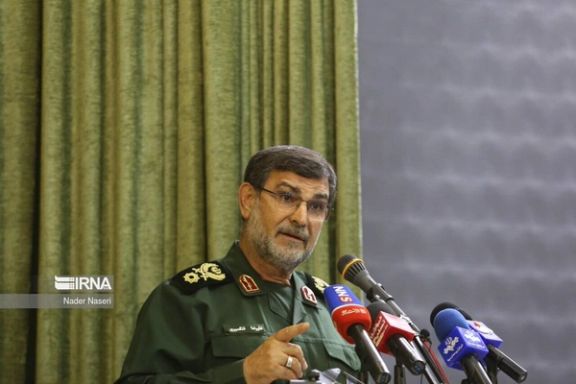
The commander of Revolutionary Guard’s navy says ships belonging to foreign forces are only in the region to foment tensions, referring to US warships.
Alireza Tangsiri made the remarks during a meeting with Ahmed bin Harith al-Nabhani, the visiting Chief of Staff of Oman's Armed Forces, stating, “Regional countries are responsible for ensuring security in the strategic Strait of Hormuz, and the presence of foreigners is only aimed at creating discord among Muslim nations." In past years, Iranian officials have repeatedly threatened to close the world's most important chokepoints for maritime oil traffic by force in response to flaring tensions with the US.
The spillover of the Gaza war, initiated by the Hamas invasion on October 7,has led to increased attacks against the US bases in the region. Washington has also moved naval bases to the region both in the Mediterranean Sea and the Persian Gulf.
Iranian authorities have leveled up their regional tours to consolidate ties with the Arab states of the region while Tehran’s proxy militias are destabilizing the region by firing missiles and attacking vessels.
On Thursday, the United States said it has intercepted and shot down an Iranian-produced drone near the Bab el-Mandeb Strait in the southern Red Sea. A day later, Iran's Foreign Minister Hossein Amir-Abdollahianmet the Houthis' envoy at the Yemeni embassy in Tehran in order to express his gratitude for the Iran-backed fighters' "support for the people of Palestine". The incident came a week after the USS Thomas Hudner, another American warship deployed in the region, shot down several one-way attack drones launched by the Houthis.
Tangsiri claimed earlier in the week that his forces had sent drones to harass the operations of the USS Dwight D. Eisenhower aircraft carrier and its strike group. The incident was confirmed and described as "unsafe, unprofessional and irresponsible" in a statement issued Wednesday by US Naval Forces Central Command chief Vice Admiral Brad Cooper.
In addition to firing ballistic missiles American targets, Houthis have fired multiple missiles and drones at Israel and attacked two ships that they thought were Israel’s.